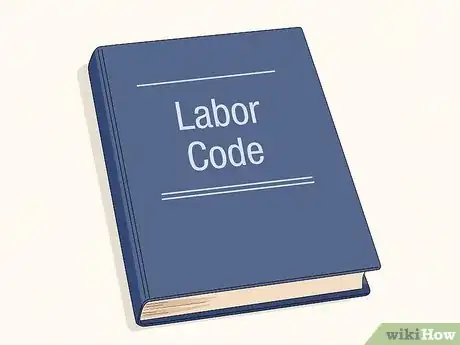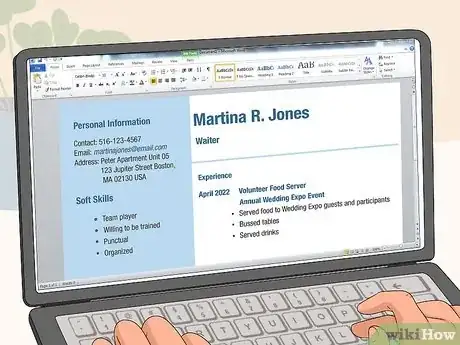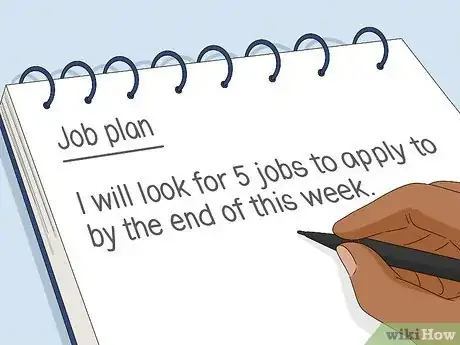This article was co-authored by Lucy Yeh. Lucy Yeh is a Human Resources Director, Recruiter, and Certified Life Coach (CLC) with over 20 years of experience. With a training background with Coaching for Life and Mindfulness-Based Stress Reduction (MBSR) at InsightLA, Lucy has worked with professionals of all levels to improve the quality of their careers, personal/professional relationships, self marketing, and life balance.
wikiHow marks an article as reader-approved once it receives enough positive feedback. In this case, several readers have written to tell us that this article was helpful to them, earning it our reader-approved status.
This article has been viewed 28,904 times.
Getting a first time job is an important rite of passage for teenagers and one that can help prepare them to face their future as adults. Teens are already walking a fine line between wanting to be treated more like adults and still needing your guidance. Parents may think that withholding spending money is the perfect way to get their teen up and out of the house, but there is definitely a better, more positive way to help in this critical time.
Steps
Getting Your Teen Motivated
-
1Get your teen excited about the idea of getting a job. Before you can even start to motivate or encourage your teens to get a job you have to get them excited about the idea. Most teens will question the reason for everything until they are satisfied with the answer.
- Usually, it is not that the teen is “lazy” or that he does not want to do what is being asked of him, it is rather that he needs to have a personal connection to the motivation, a reason for why he is going to do this or why he is being asked to do it.
-
2Think of some ideas to motivate your teen. For the teen, motivational reasons for wanting to get a job could include:
- The chance to get valuable work experience.
- The chance to improve interpersonal skills.
- The chance to learn new skills like time management and more.
- The freedom to have spending money which teaches additional skills like responsibility and budgeting.
Advertisement -
3Try to understand any worries or concerns your teen might have. The teen that has shown no interest in getting a job may not be lazy but may be dealing with other problems.
- Teens that are playing sports or trying to excel in school realistically may not have enough free time to pursue a low-paying, part time job and may not want their prior commitments to suffer. Over scheduled kids are often overwhelmed and may not see a way to add something else to his already overly busy schedule.
- Another issue could be a sense of low self-esteem. The teen does not want to try to get a job because he already feels as if no one will want him anyway. For this teen, preparation will be crucial because rejection could send him into a dangerous spiral of depression and despair.
-
4Help your teen to deal with any fear. Most kids will have some sense of fear because this is a new process for them. As a parent, it is important to separate normal fear and anxiety from the laziness and proceed accordingly.
Helping Your Teen to Find a Job
-
1Research child labor laws in your state. If your teen is under age (18 in most states) help him to research the child labor laws in your state so that you will have an idea of how many hours he can work, what times he will be restricted to working and other legal information like wages, holidays and more.
- This will not only help you to know when your teen will be working but may help him to be better prepared for the interview process.
- You may also need to find out if he will need a work permit before starting a job.
-
2Get your teen to find out which places are hiring. Most places do have applications online but others require you to come in and ask for one. Ask your teen if he would like for you to go with him to do this - he may have you wait in the car or he may want to do this on his own.
- Set a reasonable goal with him and then make sure that he complies with the goal. Asking him to get five applications for a day is not asking too much.
-
3Let him fill out the applications by himself. Now is the tough part. The teen will need to fill out the application for himself. Answer questions and clarify things if he is stuck but do not stand over him while he does it and do not offer to fill them out for him. That is undermining the entire process.
- Remember, you are not the one that is trying to get a job. Have him look up information for himself but give him some hints about where to find it.
- If he does not know his social security number by heart, for instance, you can tell him it is in your baby book and then let him go and get it.
-
4Help him get his resume in order. Most teen's resumes will have virtually nothing on them beyond their school information but that is fine. The key is to teach him the process of creating and then updating a resume.
- If you have not already done so, use a resume making program or a template to make the process easier (most word processing programs have many built in).
-
5Talk to your teen about the possibility of rejection. Before your teen takes any of the applications back to turn in, talk to him about rejection. Remind him that almost no one gets a job on his first try to that he likely to be passed over for a lot of the jobs that he is applying for. Eventually though, he will get called for an interview.
-
6Offer to help him prepare for his interview. When your teen gets a call about an interview, you'll need to run through the basics of the interview process with him. Go over tips for what to wear but do not micromanage. Offer to do mock interviews with your teen so that he gets a feel for what to expect.
- Ask him questions that he is likely to encounter during the interview and let him answer as he sees ft. After the mock interview is finished go over it with him. Did it go well in his opinion? What does he think could have been better?
- While it might be tempting to correct every single thing you found “wrong” wait for him to ask before offering advice. Part of the process is learning to fail with grace and dignity. Your teens will never learn that if they know you are always going to swoop in and fix everything for them.
- Remind your teen to read and re-read the job description. Also, encourage them to research the job, the company, the company's social media, the company's website, and more.[1]
- Encourage your teen to ask questions during the interview. They can come up with these inquiries by researching the employer ahead of time![2]
-
7Be encouraging but realistic about his chances. It is important to be positive about your teen's chances of getting a job but not overly so. Be realistic but try not to make it all sound hopeless and dour.
- Your teen needs to know the reality of what he is facing: adults who can work more hours in the same workplace, kids with better penmanship, a better appearance or better interviewing skills.
- Remind him that most of those things are things that he can work on - he can’t change competition in the workplace but he can be the best that he can be and that is good enough.
-
8Do not punish your teen if he can't find a job. Remind your teen of the goal that they set for themselves and what they are working for, but do not withhold allowances or cut off all money thinking that this will be the key.
- This can backfire and make them think that your love is conditional at a very critical time in their development. This can impact their self-esteem and may cause them to stop trying.
- Your job as a parent is to have healthy, happy and well-rounded kids that make it to adulthood with most of their joy and positive energy still in place.
Dealing with Reluctant Teens
-
1Set some ground rules for difficult teens. Some teens will resist any effort and will do so with a lot of eye rolling, back talk and even outright disrespect.
- The most important thing is to remind them that although they are almost adults, they are still living in your home and they need to follow the rules established there and contribute to the household.
- Set up a meeting with your teen and establish an agenda. Take a firm but loving approach and tell them that there will be no more of their behavior and that they will be following through on a job plan
-
2Give your teen a time frame to write up their job plan. For example: "I will look for 5 jobs to apply to by the end of this week. I will follow up on 2 jobs by the end of next week." Do not critique their plan unless it is obvious that they are not even trying.
-
3Let your teen know about the consequences. At this point, some of the words of the experts are going to have to give way to what works. If you cannot motivate your child out of a sense of pride or responsibility, hit him where it will hurt.
- For example, you could tell your teen "if you fail to meet your goals, then your cell phone bill will not be paid for the month." Some family plans will let you turn numbers off for brief periods- so if you need to do that you can do so without penalty.
- When the teen has to use your phone for social or school related things, then he might pay attention to what you are trying to say.
-
4Keep your teen busy at home. If you are just letting your teen slouch on the couch while he is home and not earning his keep, then you are sending mixed signals.
- Give him chores beyond what he normally does and tell him that if he is going to live there without a job then he will have to pitch in more.
- Sometimes one week of doing some of the more menial house tasks is more than enough to get even the most resistant teen up and out the door.
Community Q&A
-
QuestionI want to work, but I'm afraid my parents won't allow it. What should I do?
 Community AnswerI would explain to them that you want to take on more responsibilities and earn some money to save for college. That will hopefully convince them that getting a job would be good for you. If you think they'll be worried about transportation, then you could have them drop you off and offer to walk home. It would give you some exercise and save them a few trips!
Community AnswerI would explain to them that you want to take on more responsibilities and earn some money to save for college. That will hopefully convince them that getting a job would be good for you. If you think they'll be worried about transportation, then you could have them drop you off and offer to walk home. It would give you some exercise and save them a few trips!
Warnings
- As a parent, it is important that you do not instill the belief that all work is only about the paycheck. It's also about gaining new skills and experiences and becoming independent.⧼thumbs_response⧽

























-Step-19-Version-3.webp)



















































